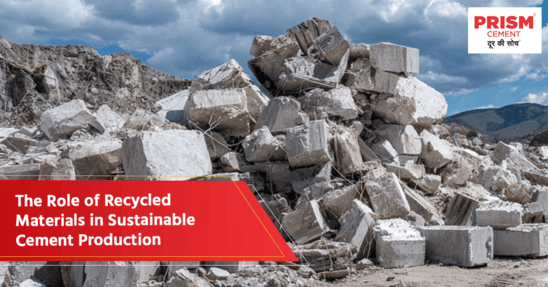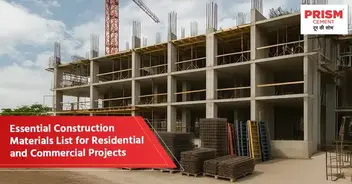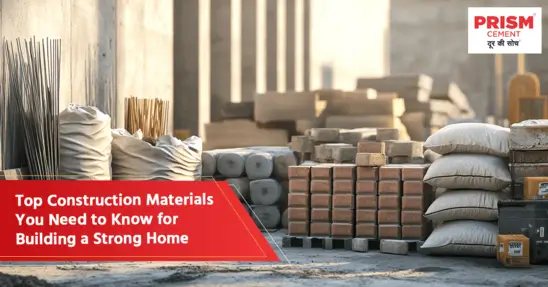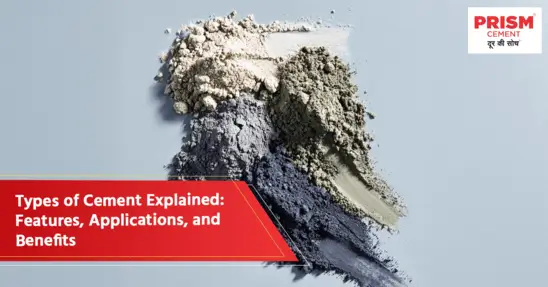As the world becomes more conscious of environmental concerns, industries are increasingly being challenged to find ways to reduce their ecological footprint. One such industry that is making significant strides in sustainability is the cement industry. Sustainable cement production is an essential part of the shift towards greener construction practices, and recycled materials play a crucial role in this transition.
In this blog, we’ll explore how recycled materials are integrated into cement manufacturing, their environmental and economic benefits and how Prism Cement contributes to sustainable building solutions.
Cement’s Environmental Challenge
The cement industry is one of the largest contributors to global CO2 emissions. This is due to the energy-intensive process of producing cement and the chemical reactions that occur when cement raw materials, such as limestone, are heated in a kiln. As a result, reducing the environmental impact of cement production is a significant challenge for the cement industry.
The industry is partly addressing this challenge through use of recycled materials in sustainable cement production. By incorporating waste materials into the cement mix, cement manufacturers can significantly reduce reliance on raw materials and fossil fuels, while creating an eco-friendly product.
What Are Recycled Materials in Sustainable Cement Production?
Recycled materials in sustainable cement refer to the byproducts or waste materials that are reused in the production of cement. These materials, often sourced from industrial processes or construction waste, replace a portion of traditional raw materials, such as limestone, clay and gypsum. This approach not only helps to divert waste from landfills but also reduces the environmental impact of cement production.
At Prism Cement, we are incorporating recycled materials into our products to create eco-friendly building solutions without compromising on quality or performance.
Common Recycled Components Used
Several types of cementitious materials are commonly used as recycled materials in cement production. These include:
- Fly Ash: A byproduct of coal combustion in power plants, fly ash is one of the most widely used waste materials in cement production. It improves the workability and durability of concrete while reducing the carbon footprint of the cement.
- Slag: A byproduct of steel production, slag is another common cementitious material used in the production of sustainable cement. It enhances the strength and durability of concrete and is especially useful in reinforced concrete cement applications.
- Silica Fume: A fine powder that is a byproduct of silicon metal and ferrosilicon alloy production, silica fume is often used in high-strength cement mixes due to its ability to increase the density and reduce the porosity of concrete.
- Recycled Concrete: Crushed concrete from demolition projects can be reused as aggregate in concrete, reducing the need for fresh quarry materials.
How are these Materials Integrated?
Integrating recycled materials into sustainable cement is an essential part of creating a more sustainable building product. The process involves blending of these materials with clinker during the manufacturing process. The specific amount and type of recycled materials used depend on the desired cement properties and the performance requirements for the specific application.
For example, fly ash can replace a portion of the clinker used in cement production, reducing the amount of limestone that needs to be heated and lowering CO2 emissions. Similarly, slag can be blended with clinker to improve the concrete's resistance to sulfate attacks, making it an excellent choice for infrastructure projects in aggressive environments.
Environmental Benefits of Using Recycled Materials in Sustainable Cement
Incorporating recycled materials into sustainable cement production offers several significant environmental benefits:
Waste Diversion and Circular Economy
One of the key advantages of using recycled materials is that they help divert waste from landfills. By incorporating industrial byproducts such as fly ash and slag, the cement industry supports the circular economy, where waste is reused rather than disposed of. This reduces the amount of waste that needs to be managed and contributes to a more sustainable construction process.
Reduced Resource Extraction
By using recycled materials, the need for extracting virgin resources such as limestone, clay and sand is reduced. This not only helps conserve natural resources but also lowers the environmental impact of mining and quarrying activities, which can be destructive to local ecosystems.
Economic and Structural Advantages of Sustainable Cement
The use of recycled materials in sustainable cement also provides several economic and structural advantages:
Cost Reduction in Raw Materials
Using recycled materials, mainly fly ash and slag, can reduce the overall cost of cement production. These materials are often more affordable than traditional raw materials, making sustainable cement a cost-effective solution for builders and developers.
Improved Durability and Performance
Sustainable cement made with recycled materials offers enhanced durability and performance. For instance, slag-based cement is more resistant to sulfate attacks, while fly ash improves the workability and long-term strength of the concrete. This makes recycled cement an excellent choice for projects that require high durability, such as highways, bridges, and marine structures.
Conclusion: Building a Greener Future with Sustainable Cement
As the construction industry seeks to reduce its environmental impact, sustainable cement offers an effective solution. By incorporating recycled materials into the production process, we can reduce waste, conserve natural resources, and lower carbon emissions.
At Prism Cement, we are using sustainable building solutions that support a greener future without compromising on quality or performance. Whether you're working on residential, commercial, or infrastructure projects, our sustainable cement is the perfect choice for building structures that are both strong and environmentally responsible.
FAQs
Q1. How do recycled materials contribute to the development of sustainable cement?
Answer: Recycled materials help reduce the need for raw material extraction, lower energy consumption, and reduce CO2 emissions. These materials also help divert waste from landfills, contributing to the circular economy and making cement production more sustainable.
Q2. What types of recycled materials are commonly used in sustainable cement production?
Answer: Common recycled materials include fly ash, slag, silica fume, and recycled concrete. These materials enhance the performance of cement while reducing the environmental impact of production.
Q3. Is sustainable cement made with recycled materials as strong and durable as traditional cement?
Answer: Yes, sustainable cement made with recycled materials can be as strong and durable as traditional cement. In fact, materials like slag and fly ash can improve the concrete’s resistance to chemicals, moisture and cracking, enhancing its overall durability.
Q4. How does using recycled content in sustainable cement help reduce environmental impact?
Answer: Using recycled content reduces the need for raw material extraction, lowers CO2 emissions, and diverts waste from landfills, all of which contribute to a more environmentally responsible construction process.
Q5. Can sustainable cement with recycled materials be used in all types of construction projects?
Answer: Yes, sustainable cement with recycled materials can be used in a wide range of construction projects, including residential homes, commercial buildings and infrastructure projects such as highways and bridges. Its durability and cost-effectiveness make it a versatile option for many applications.




